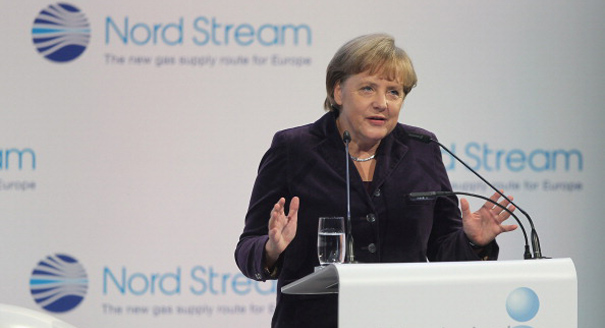As if things weren’t bad enough for Angela Merkel. The German chancellor is being assailed left, right, and center inside and outside her country for her (slowly modified) open-door policy toward refugees. Many of the 28 EU countries have already closed their borders, refusing to provide safety for the millions fleeing the wars in Syria and Iraq.
It’s not only Merkel’s policy on refugees that has alienated her European allies. Increasingly, there is growing resentment from Italy, Poland, the Baltic states, Ukraine, and Central European countries about Berlin’s determination to build Nord Stream 2. Germany should walk away the project, they say.
The Russian-German project also involves three other energy companies: France’s Engie, the Netherlands’ Royal Dutch Shell, and Austria’s OMV.
Nord Stream 2 has become so controversial for its opponents because it runs contrary to Merkel’s policy toward Russia in addition to undermining the EU’s energy policy. Indeed, what Nord Stream 2 confirms is that national interests take precedence over—or certainly undermine—a common EU policy on energy security and efforts to establish an EU energy union.
Merkel’s support for Nord Stream is particularly puzzling. She has been the one European leader who has consistently taken a tough stance against Russian President Vladimir Putin. It was she who pushed the EU member states to impose sanctions on Russia for its annexation of Crimea in March 2014 and its subsequent invasion of eastern Ukraine.
It was she who, along with the Russian, Ukrainian, and French leaders, negotiated the Minsk accords aimed at ending the fighting in eastern Ukraine.
Above all, it has been Merkel who has turned away from Germany’s Ostpolitik, or Eastern policy. Successive German leaders had pursued this strategy of rapprochement with Russia believing it would stabilize Europe and nudge Russia toward modernization. Merkel has had no illusions about either goal, which is why she didn’t pursue Ostpolitik, which is still cherished by some of her Social Democrat coalition partners. Yet her unstinting support for Nord Stream contradicts her policy toward Russia.
#NordStream2 runs contrary to #Merkel's policy toward Russia.Tweet This
That support has won her few friends. It has provided Poland’s new nationalist-conservative government with further reasons to criticize Berlin, if not encourage an anti-German policy. For Poland’s governing Law and Justice party, Nord Stream not only denies Poland and Ukraine transit fees for sending Russian gas to Europe. Warsaw also sees Nord Stream as representing a German-Russian alliance at the expense of Poland, Ukraine, and other countries in the region.
Italy’s Prime Minister Matteo Renzi has also joined the chorus of opposition, going so far as to accuse Germany of double standards. After all, Italy’s ENI energy company was all set to build South Stream with Gazprom. That project, consisting of a gas pipeline under the Black Sea, would have given Russia the great prize of establishing a strong foothold in Southeastern Europe.
The European Commission, the EU’s executive, thwarted such ambitions. It argued that South Stream could go ahead only if it complied with the EU’s Third Energy Package and the EU’s energy liberalization policies, which stipulate that access to pipelines must be opened to third parties. Had Gazprom complied, South Stream would have lost its raison d’être. Russia abandoned the project.
Renzi is now questioning why the commission won’t stop Nord Stream 2, just as it did South Stream. He has also directly criticized Germany for defending Nord Stream and for having opposed South Stream.
As for those countries that want the EU to have an energy policy based on security, diversification, and liberalization, German support for Nord Stream undermines those very policies.
#NordStream2 would make #Germany more dependent on Russian energy.Tweet This
Nord Stream 2 would make Germany more dependent on Russian energy. “Increased imports of Russian gas in combination with increased investment from Gazprom in German gas infrastructure would also translate into bigger German dependence on Russian gas,” argues energy expert Agata Łoskot-Strachota in a recent paper on the issue.
Nord Stream 2 would also strengthen Gazprom’s position and leverage on the Northwestern European market in addition to hindering diversification of sources of supply, “which in the longer term could enable Russia to increase its prices again,” she adds.
Above all, Nord Stream 2 would hinder the development of a cohesive EU policy on Russia—one that Merkel managed to build during the Ukraine crisis. For all that, she is not prepared to dump a pipeline that is undermining such cohesion.






